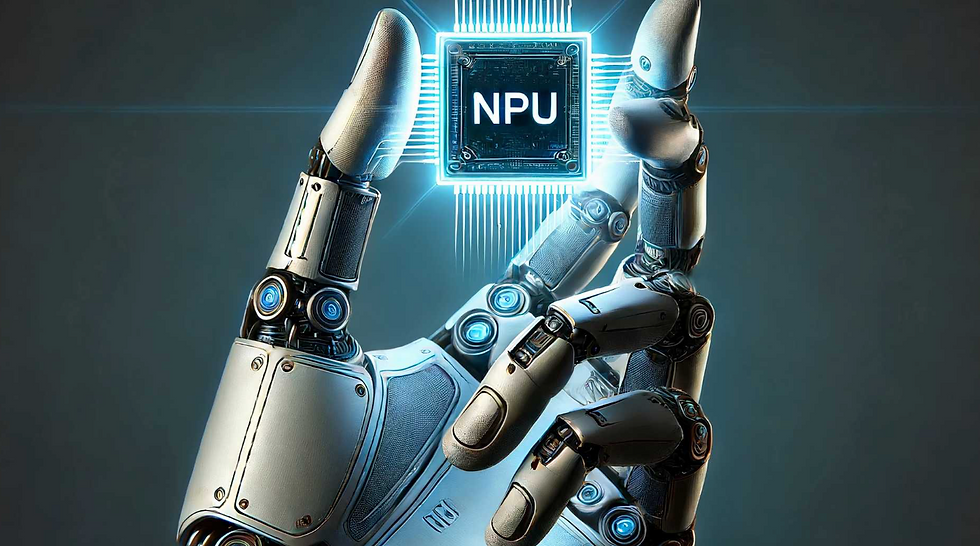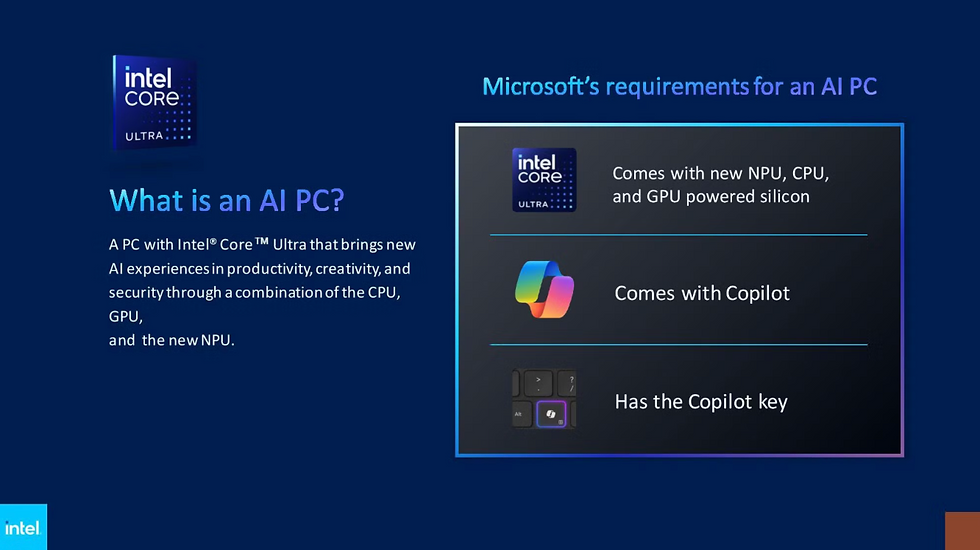AI PCs Have Arrived! What does that entail, and what actions can they undertake?
- Daniel Wilson
- Jun 13, 2024
- 4 min read
Considering the purchase of a new laptop or desktop computer? It could potentially be an AI PC: a computer with integrated AI processing capable of doing AI tasks more rapidly and, crucially, locally.

This represents a significant departure from the hardware specifications we have traditionally assessed, such as the amount of RAM in a new device or the speed of its processor. AI PCs have arrived to deliver AI processing directly to your desktop, and, akin to other hardware, numerous manufacturers are vying for your consideration.
What constitutes an AI PC?
An AI PC is a computer that has a neural processing unit (NPU), a specialized processor intended to enhance the efficiency of neural computation operations.
An AI PC is equipped with a novel chip that operates in conjunction with the CPU, GPU, RAM, and other components. The primary objective is to accelerate AI processing processes, facilitate local AI processing (envision: ChatGPT operating offline on your desktop), enhance voice recognition, natural language processing, and additional functionalities.

The majority of AI technologies operate in a cloud-based environment. Utilizing ChatGPT, Copilot, Claude, or other numerous generative AI chatbots constitutes online communication. You submit your request, transmit it, and the data is relayed to the cloud-based AI server; it processes the request and provides a response. Behold, you are utilizing AI; yet, it necessitates a continuous online connection.
AI PCs enable the execution of AI activities locally, eliminating the need to transmit data over the internet. Eventually, AI PCs will provide profound integrations at the operating system level, enabling management of settings, features, search functionalities, and additional aspects. Windows 11 users have previously encountered the predecessor of these integrations through Copilot for Windows 11. The desktop version presently necessitates an online connection; yet, it is capable of executing fundamental activities such as launching applications and making minor system adjustments, providing a glimpse into the future trajectory of AI PCs.
What is the Function of an NPU?
An AI PC possesses fundamental components akin to any standard PC, in addition to a neural processing unit. The neural processing unit is a specialized processor engineered to accelerate artificial intelligence operations. Although GPUs excel at certain AI functions, such image synthesis and editing, NPUs are specifically built for the swift processing of AI algorithms.
NPUs possess several essential features, including exceptional performance in parallel processing and matrix multiplications. They are exceptionally efficient in executing pre-trained AI models, such as GPT-4 or Gemini. They are generally highly energy efficient, which is remarkable given the substantial processing demands they must meet, and they also have integrations for AI frameworks like TensorFlow and PyTorch, facilitating usage and development.
NPU performance is presently quantified in TOPS (Tera Operations Per Second). This quantifies the number of trillions of operations the NPU can execute every second. In general, a larger value signifies superior performance in computer hardware.
In December 2023, Intel introduced their AI-enabled Meteor Lake CPUs including 10 TOPS. In early June at Computex 2024, Intel unveiled their new Lunar Lake CPUs, featuring NPUs with a performance of up to 48 TOPS.
In a rapidly evolving landscape characterized by the frequent introduction of new AI technology, anticipate a substantial increase in these values with each successive generation.
What is the Function of an AI PC?
The primary objective of an NPU is to localize AI, reduce processing time, and concentrate on local tasks.
For instance, one may anticipate:
Enhanced voice-activated assistants, featuring more profound integration with your computer
Automated scheduling via email accounts
Subscription-free on-device writing and grammatical aids
Advanced video and photographic editing tools
Assistance with the development of general content
Automation of tasks
This is really a brief excerpt, although it illustrates how an AI PC might assist with your daily tasks.
What is a Copilot+ PC?
Microsoft introduced a new standard for PCs and laptops: Copilot+. Consistent with the Copilot branding utilized across its AI products, a Copilot+ PC or laptop incorporates local AI via a Neural Processing Unit (NPU). You can initiate the use of Copilot without an online connection, thereby integrating local AI into your laptop or PC.
Only specific laptops or PCs can be designated as Microsoft Copilot+ machines. Microsoft's current specs mandate a Neural Processing Unit (NPU) with a minimum capability of 40 TOPS, a minimum of 16GB of RAM, and at least 256GB of storage. Additionally, remember to include the Copilot key.
The specifications contribute to the high demand for Qualcomm's Snapdragon X Elite CPUs, which are driving the inaugural iteration of Microsoft's Copilot+ standard.
The necessity of acquiring an AI PC primarily depends on your individual requirements. Considering an upgrade to your hardware, it is prudent to contemplate the integration of prospective AI features and processing capabilities. If you are genuinely interested in AI and aspire to be in the forefront, pursue it.
If you are indifferent to AI or content with existing online, cloud-based AI solutions, I recommend postponing the acquisition of AI-integrated PCs and laptops until further advancements occur. As previously stated, hardware evolves rapidly, and with Intel, AMD, Qualcomm, Apple, and Nvidia eagerly competing, it will not be long until we witness superior AI PCs.



Comments